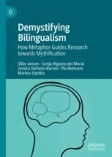Search
Search Results
-
Exploring reading-writing connections in native English speakers and English language learners
In the present study, we aimed to compare reading-writing relations between first-grade Native English Speakers (NESs) and English Language Learners...
-
Early writing skills of English Language Learners (ELLs) and Native English Speakers (NESs): examining predictors of contextualized spelling, writing fluency, and writing quality
This study examined the writing skills of first-grade students who are English Language Learners (ELLs) or Native English Speakers (NESs). We...
-
Word and child characteristics in vocabulary learning of native English speakers and bilingual learners
This study investigated how word and child characteristics affect children's ability to learn the meanings of novel words. Participants were fourth-...

-
Sensitivity to derivational morphology as cues to lexical stress among English as second language learners
Derivational suffixes are known to play a crucial role in assigning stress to multi-syllabic words among native English speakers. However, it is...

-
From Productive -ness Word-Formation to Creative Suffix -iness: The Case of Truthiness
This corpus-based study examines both semantic and syntactic properties of the 2005 coinage truthiness from a cognitive perspective, contrasting it...
-
What do classroom teachers of varying backgrounds know about English spelling?
The ability to encode (spell) is an integral writing skill needed to communicate effectively. The ability to spell, also, enhances decoding as...

-
Tutors’ Perspectives of English Private Tuition in France: Challenges and Implications
In France, English has become the most studied international language at school and is regarded as an asset for workers. In order to stand out in the...
-
Broken Promises? The Florida Consent Decree, Multilingual Learners in Mainstream Classes, and Assimilationist Practice
In 1990, the Florida Department of Education was sued for not assisting multilingual learners (MLLs) in their navigation of content. The result was...
-
English Phonetics and Phonology
Phonology concerns the principles of organization of the various possible sounds in a given language. Phonetics, on the other hand, deals with speech...
-
Incorporating Pragmatics into Primary English Language Teacher Education
Despite growing emphasis on the teaching of English as a language for intercultural communication, pragmatics tends to be underrepresented within...
-
Corpus-Linguistic and Cultural-Cognitive Perspectives on Silence in Black South African English
The present chapter focuses on cultural-cognitive dimensions of eloquent silence in situations where the act of not speaking is purposeful and...
-
Multilingualism in the Workplace
As the world becomes increasingly globalised, contemporary workplaces often become sites of linguistic diversity. Multilingualism can be both an...
-
From “English as a Native Language” to English as a Lingua Franca: Instructional Effects on Japanese University Students’ Attitudes Towards English
This chapter explores how Japanese university students (un)change their attitudes towards English and English communication through academic content...
-
A Corpus-Assisted Study of Nominalization in Translated and Non-translated Judgments
This exploratory study examines nominalizations in judgments by comparing three comparable corpora, the translated English judgment corpus (Hong Kong...
-
Follow the (Non-)Native: Circulating, Map** and Territorialising the Esperanto Community
Beginning with an ethnography of the Universal Esperanto Association's bookshop, in Rotterdam, this chapter investigates how the status of the...
-
How morphological structure affects phonetic realisation in English compound nouns
Many studies have shown that syntagmatic and paradigmatic aspects of morphological structure may have an impact on the phonetic realisation of...

-
Deconstructing the German- and Italian-Speaking Schooling Systems
The ‘separate but equal’ education system in South Tyrol was designed ‘to preserve the German mother tongue against “foreign” influences and...
-
In the Beginning Was the Word
Is Esperanto, the ‘universal language of peace’, still spoken? Where, how and why do people learn and speak it? Esperanto Revolutionaries and Geeks...
-
National Narratives as Language Myths
This chapter is devoted to a widespread and deeply entrenched narrative that metonymically links languages to nations and to issues of national...
-
How Is Stickage Different from Sticking? A Study of the Semantic Behaviour of V-age and V-ing Nominalisations (on Monomorphemic Bases)
This chapter aims to provide a combined lexicographic and corpus-based distributional semantic analysis of the competing nominalisations V-age and...
